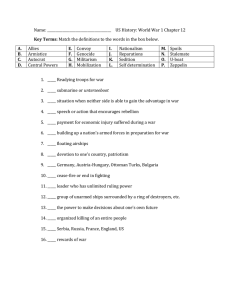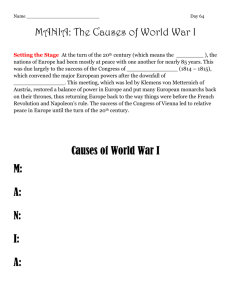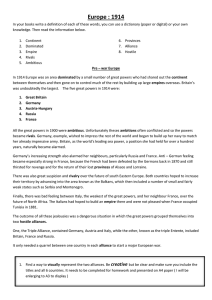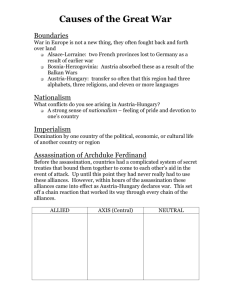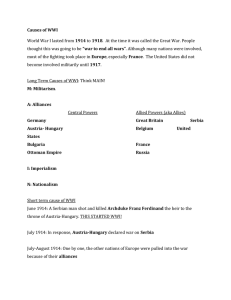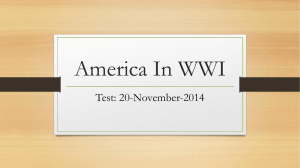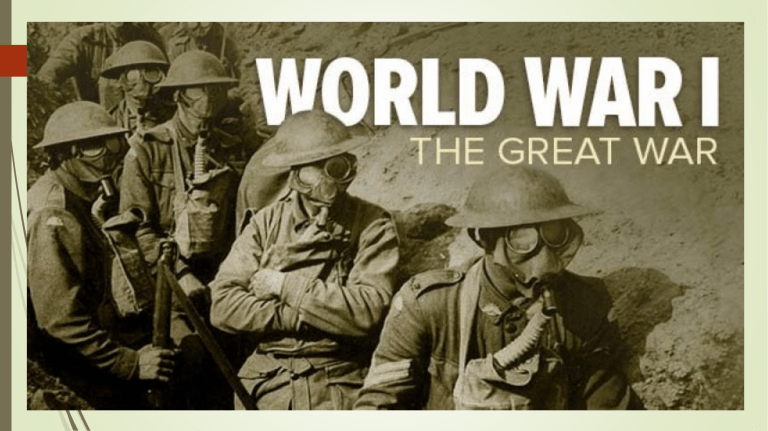
THE GREAT WAR 1914 - 1918 WHAT? WORLD WAR I, an international conflict. WHERE? The military conflict that embroiled most of the nations of Europe along with Russia, the United States, the Middle East, and other regions. WHEN? 1914 - 1918 WHY? M – Militarism A - Alliances N – Nationalism I - Imperialism A – Assassination (also know as MAIN) Text: The warmongering atmosphere in Germany before the war Text analysis ● Read the text carefully and look up every word or term you do not fully understand ● Which countries are the possible enemies and allies of Germany in a future war? ● What was the enemies’ situation like? ● What was the allies’ situation like? ● According to this article, what should Germany do in 1914 to lead the European policy? Explain it in detail "France is not yet ready for combat. Britain faces interior and colonial difficulties. Russia rejects war, because she fears the revolution within. Are we going to wait for our opponents to be prepared or, rather, should we take advantage of the favourable moment to cause the decision? This is a serious issue to be settled. The Austrian army is still faithful and useful. Italia is still strongly linked to the Triple Alliance and even if it prefers (...) keep the peace to heal the wounds of the last war, she knows (...) that if Germany is defeated, it will remain hopelessly at the mercy of France and England’s violence and it will lose its independent position in the Mediterranean (...) We can also, in case of war, count on Turkey and Romania (...) We could lead the direction of the European policy through a resolute offensive, and we secure our future. This does not mean that we should provoke war, but wherever a conflict of interest turns out (...) we should not go back, but solve it by means of war and start it with a resolute offensive, no matter the excuse, because it is not that conflict, but our future what is at stake. " CAUSES OF THE WAR The factors that explain the outbreak of the First World War are varied. These are the : main ones The new international expansionist policy undertaken by the German Emperor Wilhelm II in 1890. He sought to turn Germany into a world power. . The Weltpolitik ("world politics") Germany was seen as a threat by the other powers and destabilized the international situation The change in the power balance between economic powers. The second industrial revolution, which began in 1870, shifted the balance of economic might between the powers. The increasingly powerful Germany challenged British hegemony (increasing economic power and naval rearmament in Germany). Territorial rivalries between the European powers. Two particularly serious clashes took place: The Franco-German rivalry, unavoidable since the annexation of Alsace-Lorraine by Germany in 1870 The rivalry between Russia and Austria-Hungary for hegemony in the Balkans. Psychological rivalry between peoples, encouraged by nationalist propaganda campaigns. Formation of alliances In the years before the war, the powers were forming military alliances to defend their objectives: The Triple Alliance linking Germany with Austria-Hungary and Italy. It was signed in 1882, in the days of Chancellor Bismarck. The German Reich and the AustroHungarian Empire constituted the core of this alliance. The Triple Entente, which was made up of Britain, France, and Russia, concluded by 1907. The increasing German aggression led to Britain and France ending their colonial differences. The rivalry between Austria-Hungary and Russia in the Balkans pushed Russia into the alliance. No way back. Outbreak of the war. The final crisis took place on June 28, 1914 when the Archduke Franz Ferdinand, heir to the Austro-Hungarian throne, was assassinated in Sarajevo (Bosnia). An activist Bosnian Serb, Gavrilo Princip, a member of the Serbian nationalist organization "Black Hand" killed the Archduke. At the time of the assassination, Bosnia was the focal point of a dispute between AustriaHungary and Serbia. The Austrian-Hungarian government was convinced that Serbia was behind the assassination and used the event as an excuse to crush its enemy. Upon declaration of war a chain reaction began leading most of Europe to war. The alliances started working and it led from a local conflict to a general war in Europe and the world. WORLD WAR I STUDY GUIDE 1. List and DESCRIBE at least four causes of WWI 2. Define or describe the following terms: NATIONALISM IMPERIALISM TERRITORIAL EXPANSION HEGEMONY ALLIANCE

